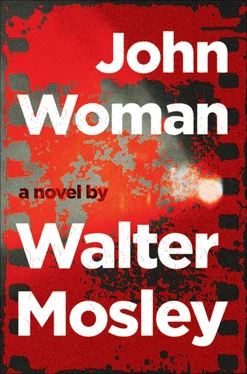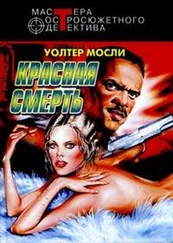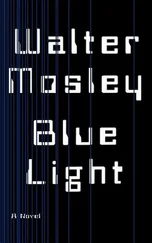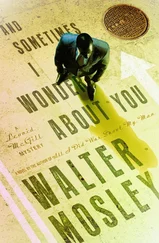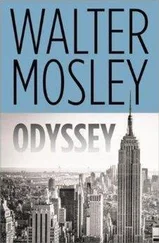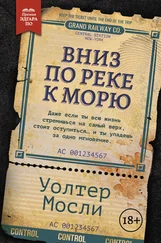John smiled. Tyne took this expression as a dismissal and left, walking down the cobblestone lane laid between the grassy lawns and various flowering bushes that stood out in front of the bungalows. The office facility had its own gardener but John had forgotten, or maybe he’d never known, the groundskeeper’s name.
John stood outside the possibly doorless doorway enjoying the specific language of floaters and foot-errands while feeling the desert sun’s heat filter through his dark clothes. He took in three breaths before he was prepared to enter the president’s lair.
The large room through the open door was a study in blues.
The floor had wall-to-wall indigo carpeting. Its six walls were cerulean; upon each wall hung a solitary oil painting depicting some oceangoing sailing ship forging its way across shoreless seas. The eighteen-foot-high ceiling was almost white — like a cloud-filled sky with only hints of a blue beyond.
Straight ahead, maybe twenty feet past the door, was a big metal desk painted crayon blue. Behind the improbable office furniture sat a bronze-colored woman who was easily twice John’s age. She wore a dark blue jacket and a bright orange silk blouse. The clothes looked bulky on her lean frame and her smile communicated neither humor nor warmth.
Her hair had already turned white and was now verging on blue, maybe in sympathy, John thought, with the color scheme of her workplace.
“Professor Woman,” she said, distaste for the designation on her lips.
“Ms. Whitman.”
“Mrs. Whitman,” she corrected.
“Mrs. Whitman.”
Behind Bernice Whitman were three evenly spaced entrances to hallways; the outer two at one-hundred-forty-degree angles to the central door. John was always surprised by the magnitude of the president’s complex. From outside the building seemed modest despite its extra floor.
“He’s waiting for you,” Mrs. Whitman said. “You’re late.”
“You should have somebody enter the right classroom number in the database,” John said, unable to ignore the bait in her words. “You’re lucky Ms. Oliver found me.”
Whitman grunted and John turned to his left where there was a blue-washed wooden ladder that led to the floor above.
“You can take the elevator or the stairs,” Mrs. Whitman offered.
But John was already climbing up through the hole in the almost completely white sky.
President Luckfeld’s office was not the size of the entire first floor but it was still the largest room that John had ever been in that wasn’t a hall, an auditorium or some other public space. The floor was paneled oak, the hall dominated by floor-to-ceiling windows interspersed with white walls sporting oil paintings of modern-day folks in pedestrian poses and garb.
There were open areas in the great chamber that approximated wall-less rooms. To the left were two yellow sofas that faced each other over a bloodred carpet. Behind one of the sofas was a large wooden bookcase. A little farther on, to the right, stood a two-foot-high platform containing an entire kitchen of blond pine and glistening chrome.
On the other side of the chamber, opposite the blue-washed ladder entrance, was a long table behind which sat the president. At his back was a seemingly solid glass wall that led out onto a deck that was twice again the size of the office.
“John!” the president called.
“Yes, sir.”
“Come in, come in.”
John walked toward Colin Luckfeld counting the steps as he went. By the time he reached the teak table he’d gotten to seventy-two.
The unorthodox desk was a small wonder in the amazing room. It was nineteen feet long and five wide, a single plank cut from the heart of what must have been a magnificent tree.
When John reached the table Luckfeld stood up. He was tall and hale with sun-burnished skin and brown hair that was like a tapered mane. In his fifties, the president had eyes that were olive green, sometimes tending toward brown; his hands were strong with long fingers and perfectly manicured nails. He wore a medium-brown two-piece suit and a black T-shirt.
“Thank you for coming, John,” he greeted him.
Everyone said Luckfeld’s eyes expressed unspoken knowledge. This was his advantage. But the gaze held no power over John — he felt safe behind an exhaustive facade that had taken him nearly half a lifetime to create.
“Sorry I’m late, Colin.”
“Mrs. Whitman says that the faculty database wasn’t properly updated.”
John could see the earbud in Luckfeld’s left ear. The dour assistant had called while John was counting steps.
“Would you like something to drink?” the president offered.
“Water if you have it.”
“Certainly. Why don’t you come around and sit here next to me.”
Seating in the president’s office was one of the many ritualistic elements Luckfeld employed. Most faculty members were directed to sit on hard wooden chairs across the table from the president. He had a seemingly endless number of these chairs which were always set out before his guests arrived.
A few feet behind the big yellowy table sat a camel-colored leather sofa and a matching chair. If Luckfeld asked you to come around and sit on one of these, it was said, he was extremely happy with you and your work.
John counted eleven paces around the table to his host.
“Sit,” Colin Luckfeld said, gesturing at the sofa.
John sat at the window end. The president sat opposite him.
John wondered what the superstition would be about Luckfeld sitting next to his guest on the couch rather than across from him on the matching chair.
“There’s a wooden chest behind you,” the president said. “I’ll have one too.” Professor Woman lifted up the lid and brought out two label-less plastic containers. He leaned over to hand his boss one of these.
“You’re looking well,” Luckfeld said. “Nice summer?”
“I stayed in faculty housing and caught up on my reading.”
“No vacation?” Colin asked as he cracked the seal of the water bottle.
“Life is a holiday if you enjoy the work.”
Luckfeld brought his left thigh onto the cushion and leaned back against the plush bolster arm. This posture made him seem somewhat boyish — very un-presidential. In Professor Woman’s mind this was simply another tactic employed by the high official of the worldwide cult.
“You enjoy history that much?” Luckfeld asked.
“More.”
Luckfeld brought the pad of his left thumb to press lightly on the indentation under his lower lip and stared with those knowing eyes.
John allowed the gaze to continue at least half a minute before saying, “Those portraits along the walls.”
“Yes?”
“I’ve always wondered about them.”
Luckfeld’s eyes relaxed. “Great men and women caught in everyday poses. The artist worked from snapshots taken at some point in the subjects’ past. You have a captain of industry standing over a barbecue; a woman who is the confidante of monarchs and prime ministers screaming on a roller coaster at Coney Island. My favorite is the one of a man who later in life became the leader of a revolution changing the diapers on his firstborn daughter. I find them humbling and revelatory.”
“Revealing what?”
“Humanity,” Luckfeld said. “The fragility of who and what we are.”
“There’s nothing more telling than a man’s mismatched buttons and a pretty woman’s slight limp,” John intoned.
“Where’s that from?”
“Something my father once said.”
“Sounds like a wise man.”
“He was.” John took a swig of water and realized that he was quite thirsty.
They sat there in the cool room, under the desert sun, effecting a natural span between niceties and the purpose for the summons.
Читать дальше
